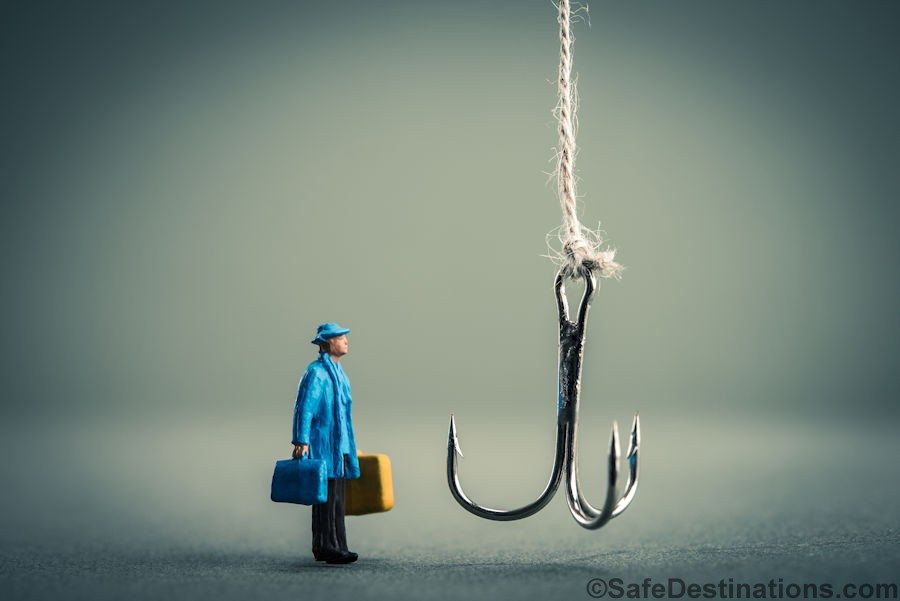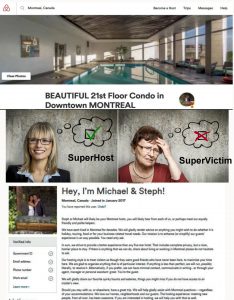Avoiding AirBNB Accommodation Scams: 10 Tips For Guests

Before you book your next stay with an airbnb superhost make sure you know these signs that you may be about to be scammed by a fake listing on airbnb.
As more and more guests seek out alternatives to hotels on websites like AirBNB the landscape of holiday and travel has shifted away from large corporate hotels to a more shared economy and an independent economy where people connect on a personal level with hosts and guests like on AirBNB.
The success of AirBNB also means that scammers, fraud artists and criminals are creating fake host and guest accounts to find victims for fraud, theft or worse. Keeping safe when using AirBNB as a guest starts with you. Don’t expect AirBNB to keep scammers and fraudsters off their website, it is impossible to identify all the fake accounts and fake real-estate agents who list multiple condos and homes against local laws or statutes.
In fact some property owners are listing their properties that are not authorized to be rented out on airbnb! BNB PI is a website that lists properties that are not to rented to guests to help guests avoid scams. See website: https://www.bnbpi.com

There are website online who buy and sell guest profiles and host profiles to create spam listings or to entrap potential guests into booking into something and then using a bait-and-switch tactic to give them something different.
A guest can lose money, have funds help in limbo, be thrown out of an accommodation or be the victim of fraud from hosts.
There are a few ways to protect yourself and most of them mean you need to take the time to investigate a potential host before booking. Never book without communicated a few times with the host, never book at a place that has “instant booking” and always look at the profile of the host and the guests who have left reviews and go back as far as you can to check older reviews.
Things to watch out for on AirBNB
Warning signs you may be looking at a scam listing
1. Hosts with instant booking who also have a strict cancellation policy
A host on AirBNB who has a strict cancellation policy usually says that a 50% refund up to 1 week prior to arrival, except fees will be issued if a guest cancels. This is an understandable policy as hosts do not want people to book their accommodation and then have them cancel after the hosts calendar has been effected. A host could lose business if guests cancelled a booking that could have been offered to another guest so the policy is understandable.
But, scamming hosts on AirBNB can use the strict cancellation fee to literally steal money from guests. If you booked an accommodation for a week and the dates of the stay were three months in advance and you cancelled after a week due to an unforeseen circumstance the host could hide behind the AirBNB strict cancellation clause and keep 50% of your booking fee even if it didn’t affect their calendar.
While AirBNB says that hosts can use their discretion to refund the full amount of a cancelled booking even with a strict policy it doesn’t mean they have to. A host can refuse to refund your money even if it seems preposterous to do so.
 You will have your money frozen and will be forced to go to AirBNB resolution to have them arbitrate which could take days, weeks or months.
You will have your money frozen and will be forced to go to AirBNB resolution to have them arbitrate which could take days, weeks or months.
2. Hosts with multiple listings
Hosts with multiple listings can be accommodation farms run by real estate speculators or scammers who rent condos and appartments and then list them on AirBNB. Sometimes hosts do not have permission from the building owner and will have guests sneak into the building or have a friend become a caretaker who handles the guests for the host.
AirBNB allows people to use associate hosts to take care of their property and handle the listings for a fee so a host with multiple listings could be a fake host who is just the middleman for either a real estate agent or a scammer who is just filling vacant apartments, homes and condos for a profit.
3. Hosts will fake reviews and fake feedback
There are services online where hosts can buy fake reviews. There are services online that buy and sell AirBNB profiles to use to write fake reviews. Fake review services will buy established AirBNB accounts because they have already been verified so they can then use them to charge hosts to write them favorable reviews to boost their rating or to become a superhost.
Look at the profiles of the reviewers and you will spot some patterns that can help indicate the host is a scammer.
– Reviewer has only one review since joining
Fake reviews on AirBNB are often done by a brand new account. If a guest profile shows they joined in July and they stayed at one place in July and the review said “Great Condo, was close to all shopping and restaurants. Great place with all amenities I could need.” you might suspect a fake. True reviews by real guests are more than just “great amenities”, “Check in was easy”, “Hosts were always available for my noobie questions” or “First time using this app and this place was perfect!” A review from a 22 year old using a tone and choice of words that are unusual for a young adult are another sign.
-Hosts often leave cit and paste style of guest feedback
Check the feedback the host leaves for the guests, a fake or host who mught be a fraudulent host will often be too lazy to write real feedback so will just say “Great Guest” or “Highly recommended” or “Enjoyed have them stay, wish we had more time to get to know them, welcome back anytime”. Fake reviews by hosts are either too simple, too generic or just plain impossible to be considered a true feedback.
-Photos of the guest profile
Fake guests who work with fake hosts will have sketchy looking profile photos. AirBNB asks that photos o be full frontal face shots so hosts and guests can see the person. A fake guest will have an odd photo or a watermark on the photo. Fake guests can pull old photos from Facebook to create false profiles as the verification process of creating new accounts can be done with merely a phone number, email and an easy to fake photo-id. Fake Facebook profiles and LinkedIn profiles are also used to pass the airbnb verification process and there are online companies that buy and sell Facebook, yelp and TripAdvisor accounts for the purpose of fruad and scamming guests and hosts on Air BNB.
4. Hosts profile is unusual
Hosts can have multiple personalities on AirBNB. Cutting and pasting a section of text from the profile of a host can help find a connection between multiple listings under different names. You can often find hosts who have exacpt copies of another hosts text on their profile. While this can sometimes be just a case of one hosts liked the style of writing you can find cases where a couple has written the same exact thing about their lifestyle and age and philosophy of guest treatment as another host.
5. Hosts have reviews or references from other hosts with similar peculiarities
Check for hosts who have reviews or references from other hosts who may be fake. Check for hosts who have reviews from other hosts in the same city. Why would a host with accommodation in the city they live in go to stay at another airbnb with another host?
Hosts who are connected to other hosts sometimes have accommodations in the same building.
6. Photos look unrealistic or generic
Hosts can find nice pictures of nice accommodations easily and guests have no way of knowing if the photos are legitimate or if they are just bait to trick guests.

7. Host has changed listings multiple times.
Hosts can close one listing and then re-list the same property with a different title. Often they will close a listing after a few bad reviews from actual guests who got ripped off or less than they expected. The host can then close the listing and re-list as a new property and buy fake reviews and have a perfect looking record.
Check old reviews and use google to search for old listings from a fake host.
8. Host has just recently joined AirBNB
Beware of hosts who have only been on AirBNB for a few months. If they also have hundreds of glowing reviews, have mutiple listings, and have a profile that sounds too good to be true. Google the city and the name of the hosts and you should find something about them somewhere. A real person should show up somewhere online if you search for the name, the city, the neighborhood or something in their profile that us more than generic sales copy. If you can’t find anything about your host try looking at the guests and use their hometown, school or name to try and find out if they are real. You’d be surprised how many fake reviews are created using abandoned Facebook pages.
9. Listing is written in bold and photos are of common areas
A scammer on AirBNB will use the “as seen on tv” style of marketing. Big bold headlines like “BEST condo in MONTREAL. GUARANTEED” or “Amazing LOFT with pool PERFECT LOCATION” will try and grab your attention with keywords that tease you with positive reinforcement. When a host is overselling it usually means they are up to getting the booking regardless of accuracy. The cancellation and refund policies of AirBNB mean that a guest can be screwed over while out of their home city or country and then be forced to first find proper accommodation and then go through the headache of trying to get customer service from AirBNB which can be a long and frustrating process.
A scammer will often use a picture of a swimming pool or the view from a balcony as their main image to try and sell part of the accommodation that is outside of their control. This could be because the pool in the building is well maintained but the bedroom where you will sleep is actually a mattress on the floor. If the listing photographs look like a staged photo from a real estate catalog it could be a sign that you’re about to be a victim of a beait and switch.
10. Host details are vague after booking
A guest cannot see phone numbers or the exact location of the hosts property until after the booking is confirmed. Once you get confirmation you need to google the phone number and address of the host, with their name, and see what comes up if anything.
A host could have a phone number that is just a cellphone making them untraceable. The name they use might just be their first name making them difficult to verify. The address they use might not correspond to your booking.
If you book a condo on the 21st floor and in the email you get from AirBNB it says the address is not a 21 storey building but actually a dry cleaning business 1 block away from a 21 storey building the chances are the host will want to meet you in front of the dry cleaners and then direct you to the 21 storey building because it’s not actually eligible to be used as an AirBNB accommodation or there are rules against the renting out of apartments to third parties.
When a scammer like this is on AirBNB and combines vague information and a strict cancellation policy it is more than likely they will try to keep any money they can even if you cancel within 10 minutes. AirBNB will not refund you automatically and you must go through the long process to get your money back.

Don’t expect AirBNB to jump in to enforce fair business practices.
They probably will but you need to be prepared for a long battle for any dispute against a host. You might believe airbnb is a wonderful community and that is mostly true but it is also filled with predators who hide behind the airbnb good name to attempt to rip people off.
A reputable hotel chain has policies in place and must follow codes of conduct for guests and with payments and guarantees. An AirBNB host does not live under the same restrictions as a real company and the entire community in AirBNB was built on trust and a shared economy but scammers and fraud artists and real-estate agents looking to cash in on the bandwagon are making it more and more dangerous to book on AirBNB.
The popularity and trust that has flourished in the early years of AirBNB may be over as the predatory nature of hosts, and guests, can give way to criminal activity and many broken vacation dreams. Such badges like being a “Super Host” don’t mean anything more than a scammer has paid for enough fake reviews from someone buying and selling fake airbnb profiles.
We’d love to hear your stories of AirBNB and what others can do to avoid being scammed by an AirBNB host.
BNB PI is a website that lists properties that are not to rented to guests to help guests avoid scams. See website: https://www.bnbpi.com